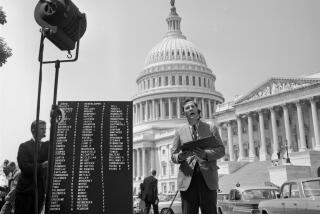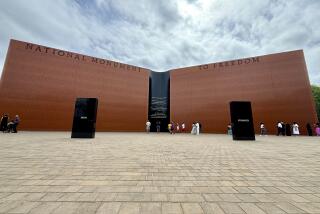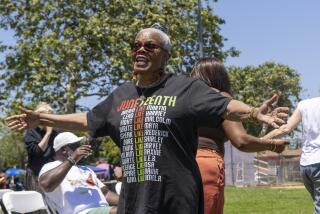Celebrating Freedom
- Share via
PACOIMA — On Jubilee Day, the first Sunday of the year, the day on which African Americans celebrate the signing of the document that set them free, 12-year-old Kristian Huling quoted Frederick Douglass to the adults in her congregation.
“We still live, and while there is life, there is hope. The fact that we have endured wrong hardship which would have destroyed any other race ought to strengthen our faith in ourselves and our future.”
While rain pounded outside the Seventh-day Adventist Church, Kristian, tall and soft-spoken, stood at the simple pulpit and talked on. About slavery, the Underground Railroad, the Emancipation Proclamation and about precious freedom.
“Today I would like to tell you about a few freedom fighters that were born in slavery and died free,” said the Hillcrest Christian School student.
Despite the rain, about 200 people from various congregations in the east San Fernando Valley packed the church on Glenoaks Boulevard to listen to Kristian and observe the day.
Similar events around the country are organized by the National Assn. for the Advancement of Colored People. Ben Jones, a member of Calvary Baptist Church and an executive-committee member of the San Fernando Valley NAACP, said Jubilee Day was once more widely observed. The celebration began to lose its appeal after the civil rights movement of the 1960s.
In Pacoima, the event is held at a different church each year.
“It’s a time of renewal of purpose, so people will know this is the day for a new start,” said Norman Bullock, 30, the newly elected president of the California State Conference of the NAACP. “The San Fernando Valley has been one of the stars on an annual basis” in promoting the event.
Inside the church, the congregation clapped and sang along with a choir accompanied by a pianist, bassist and drummer. Buddy Hogan, another executive-committee member, preceded Kristian to the pulpit and talked about history.
“Our mothers, fathers and ancestors suffered inequities that would make our troubles seem trivial,” Hogan said. Slaves worked without pay, were beaten and, often, murdered, he said.
After the proclamation was signed, he said, former slave owners mistakenly feared that the slaves would turn violently against them.
“We have always been a religious people. We have not always been Adventists but we have always loved our God,” he said between shouts of approval from the audience.
Also performing were the Ladies First--II-Hype Gospel Drill Team, of the Pacoima Community Youth Culture Center. The family of Ricky Evans, a former member of the drill team who was killed in a drive-by shooting in November, was in the audience.
When her turn at the pulpit came, Kristian pointed out that more than 130 years after the proclamation was signed, many in the African American community abuse their hard-won freedoms by killing, stealing and using drugs.
“Now we have to worry about carjackings, drive-bys and kidnappings,” she said. “How free are we?”
More than most people, Kristian is aware that freedom is a journey never finished.
“We have come a long ways, but there is a ways to go,” she said.
When she left the pulpit, the adults leaped to their feet and applauded.
More to Read
Sign up for Essential California
The most important California stories and recommendations in your inbox every morning.
You may occasionally receive promotional content from the Los Angeles Times.













